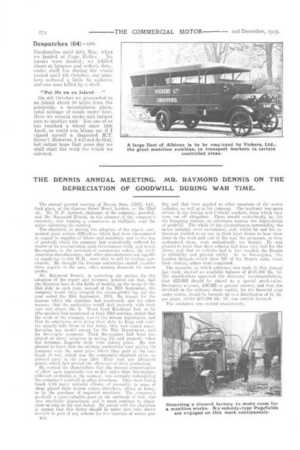THE DENNIS ANNUAL MEETING. MR. RAYMOND DENNIS ON THE DEPRECIATION OF GOODWILL DURING WAR TIME.
Page 14

If you've noticed an error in this article please click here to report it so we can fix it.
The annual general meeting of Dennis Bros. (1913), Ltd., took place, at the Cannon Street Hotel, London, on the 22nd ult. Mr. N. P. Andrew, chairman of the company, presided, and Mr. Raymond Dennis, in the absence of the company's secretary, now holding a commission in Gallipoli, read the notice convening the meeting.
The chairman, in moving the adoption of the report, commented upon serious difficulties which had been encountered in regard to supplies of labour and materials, and to the loss of goodwill which the company had undoubtedly suffered by rea,son of its concentration upon Government work, and motor fire-engines, to the exclusion of commercial orders, the while American manufacturers, and other manufacturers not capable of supplying to the W.D., were able to sell to civilian purchasers. He thought the revenue authorities should consider these aspects of the case, when making demands for excess profits.
Mr. Raymond Dennis, in seconding the motion for the adoption of the report anti accounts, pointed out that, had the directors been in the habit of making up the books to the 31st July in each year, instead of the -30th September, the company would have escaped the excess-profits tax for the year ended the 30th September, 1914, He hoped, for the reasons which the chairman had mentioned, and for other reasons, that the. authorities would deal leniently with their case and others like it. When Lord Kitchener' had, as he (the speaker) had mentioned at their 1914 meeting, stated that the work of the company was of the utmost importance, and that its employees were doing their duty to King and country equally with those in the Army, they had ceased manufacturing any model except for the War Department, and for fire-engine purposes. Their fire-engines had been employed CM Many occasions in saving life and property when the inhuman Zeppelin raids were taking place. He was pleased to know that the military authorities were paying his company only the same price which they paid at the outbreak of war, which was the company's, standard price, as printed early in the year 1014. They had not advarn!ed prices, which fact proved the efficiency of their production.
He warned the shareholders that the present concentration of effort upon practically one model, apart from fire-engines, although profitable at the moment, was seriously endangering the company's goodwill in other directions. They were losing touch with many yalua.hle clients, of necessity, as some of these placed their urgent orders elsewhere, either at home, or by the purchase of imported machines. The company's goodwill, a most-valuable asset at the outbreak of war, was now inevitably depreciated, and it must continue to depreciate so long as the war lasted. He joined with the chairman in urging that this factor should be taken into very .direct account as part of any scheme for the taxation of excess pro B-14.
fits; and that view applied to other members of the motor industry, as well as to his company. The tendency was more serious in the foreign and Colonial markets, from which they were cut off altogether. There shfrold undoubtedly be, for the foregoing reasons, an allowance against the depreciation cf goodwill. The whole of the circumstances surrounding the motor industry were exceptional, and, whilst he and his codirectors yielded to no one in their loyal desire to bear their share in the work and cost of the war, the proposals, as they understood them, were undoubtedly too drastic. He was plea-sod to know that their vehicles had done very well for the Army, and that no vehicles had in fact excelled the Dennis in reliability and general utility. As to fire-engines, the London .Brigade would have 104 of the Dennis make when their existing orders were completed.
The accounts, to which -reference was made in this journal last week, showed an available balance of £121,349 10s. The shareholders approved the directors' recommendations, that £25,000 should he placed to a special stook-valuefluctuation account, £40,000 to general reserve, and that the dividend on the ordinary share capital, for the financial yf.ax under notice, thould be brought up to a distribution of 1s. 3d. per share, whilst £11,349 10s. 1d was carried forward.
The resolution was carried unanimously.




















